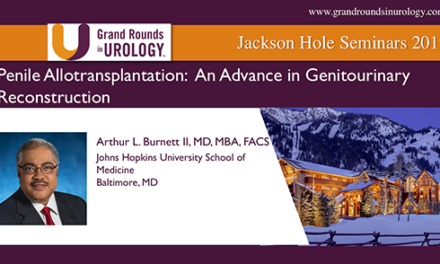Chris Gonzalez, MD, MBA, FACS, presented “AUA Urethral Stricture Guidelines” during the Jackson Hole Seminars on February 7, 2018 in Jackson Hole, Wyoming.
How to cite: Gonzalez, Chris. “AUA Urethral Stricture Guidelines” February 7, 2018. Accessed Dec 2024. https://dev.grandroundsinurology.com/Management-of-Bladder-Neck-Contracture/
AUA Urethral Stricture Guidelines
Summary:
Chris Gonzalez MD, MBA, FACS, who served on the 2016 American Urological Association (AUA) Male Urethral Stricture Panel, summarizes the guidelines his panel drafted and provides commentary. He analyzes the indications for evaluation, diagnosis, treatment, and follow up in bulbar, penile, and prostatic urethral strictures, as well as in pelvic fracture urethral injury (PFUI). Furthermore, he discusses the future research needed to perfect urethral stricture management practices.
ABOUT THE AUTHOR
Chris M. Gonzalez, MD, MBA, FACS, is the Albert J. Speh, Jr., and Claire R. Speh Professor and Chair of the Department of Urology at Loyola Medicine and Loyola University Chicago Stritch School of Medicine.
Dr. Gonzalez earned a medical degree from the University of Iowa College of Medicine and completed a urologic residency at McGaw Medical Center of Northwestern University. He earned an MBA from the Kellogg School of Management at Northwestern in 2006. He served as Chief of Urology for VA Lakeside from 2003 to 2006 and was Director of Surgery for the Northwestern Medicine Surgical Services Department from 2014 to 2015. He then moved to the University Hospitals Cleveland Medical Center in Ohio, where he served as the Lester Persky Professor and Chair of the Department of Urology and Director of the Urologic Institute from 2015 to 2018.
Dr. Gonzalez is Associate Editor for the Genitourinary Reconstruction Section of Urology and a Section Editor for Urology Times. He has published numerous peer-reviewed manuscripts, articles, editorials, and book chapters. Dr. Gonzalez is also an expert clinician who specializes in urethral stricture disease, salvage of failed hypospadias surgery, genitourinary fistula disease, erectile dysfunction, penile prosthesis placement, Peyronie’s disease, penile curvature correction, and treatment of male urinary incontinence.





